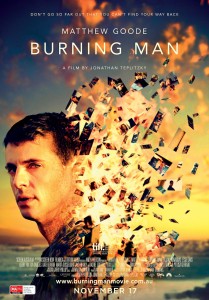[stextbox id=”grey” caption=”Burning Man (2011)” float=”true” align=”right” width=”200″]
Director: Jonathan Teplitzky
Runtime: 113 minutes
Starring: Matthew Goode, Bojana Novakovic, Essie Davis, Rachel Griffiths
Distributor: Paramount/Transmission
Country: Australia
Rating: Wait for the DVD/Blu-ray (?)
[/stextbox]
Very little was known about Burning Man prior to its release, and the final product presents itself as something of a mystery. Over a decade ago, Jonathan Teplitzky fogged up screens with his romantic comedy (of sorts) Better Than Sex, turning the already popular David Wenham into a local star. His follow-up, Gettin’ Square, earned Wenham even more acclaim with virtually every acting award in the country. After a long absence from the big screen, by way of several episodes of Spirited for subscription television, Teplitzky has returned with something entirely unexpected.
Tom (Matthew Goode, Watchmen), a British chef in a Bondi restaurant, has become a bit of a loose canon. No longer playing by society’s rules, he struggles to raise his son by himself despite the rapid downward spiral that his life has taken. As the story unravels, we witness the various women in his life trying to help him before he goes off the deep end, and the significance of his relationship with Sarah (Bojana Novakovic, Devil, Drag Me to Hell).
Burning Man begins with masturbation, and carries on for two hours in the spirit of that onanism. The fragmented storytelling that Jonathan Teplitzky employs has become shorthand for meaningful or reflective, as if audiences would quickly tire of the monotony of the tale if it were presented in a straight fashion. It might be seen as a puzzle to be solved, but make no mistake: we’ve been here before in Australian cinema. The central themes of love, loss, death and, you guessed it, suburban angst are merely repackaged, with the seemingly obligatory inclusion of minor international “star” Matthew Goode (Watchmen, Leap Year). Teplitzky has intentionally crafted a disjointed narrative to represent the fractured mind of his protagonist. This does, to his credit, keep us guessing as to the nature of Tom’s current state, but by the same token it doesn’t necessarily improve the experience at all. It’s a barrier, albeit an intentional one to keep us away from easy answers, but it also keeps us away from fully connecting with the characters.
Burning Man is a beautiful film to look at, on the other hand, and full credit should go to cinematographer Garry Phillips for making the mundane look so spectacular. Having worked with Teplitzky of both of his previous features, along with Neil Armfield’s Candy and Philip Noyce’s Catch a Fire, there is a clear knowing relationship between the director, the cinematographer and the camer, with the audience always seeing exactly what it is Teplitzky is trying to convey. There is a slow-motion sequence set inside a crashing car, and this is some of the most innovative and commercially inspired imagery that we have seen in Australian cinema in some years.
Teplitzky’s film, which he also wrote, is about coping with loss, Kübler-Rossing in its own fractured fashion. There is clearly a very personal story at the heart of this film, and one that many people facing similar tragedies in their lives will no doubt relate to. Yet in a case of form over function, the problems with Burning Man lie in the believably of the central relationships. Once again using sex as a symbol for relationships, it represents just about everything here. It is used to demonstrate the passion between Tom and Sarah, Tom’s aggressive tendencies and also his inability to relate to other people. It serves as a barrier between the audience and the characters, who are never fully fleshed out enough to feel worthwhile investing time in. It also doesn’t help that the Australia School of Exaggerated Acting seems to have been one of the biggest casting agents.
Kudos should go to Teplitzky for trying something different with the standard insular themes of Australian drama over the last decade or so, although this will do little to convince people that Screen Australia is trying to move away from an “auteur expression” model to more consumer-driven content. This isn’t to say there isn’t a place for this content in our cinema, but Burning Man fizzles where it should roar.
[stextbox id=”custom”]A fragmented narrative does little to couch that Burning Man, as touching as it can sometimes be, is a wholly familiar tale couched in the kinds of introspective filmmaking audiences will inevitably turn away from.[/stextbox]
Burning Man is released in Australia on 17 November 2011 from Transmission.





